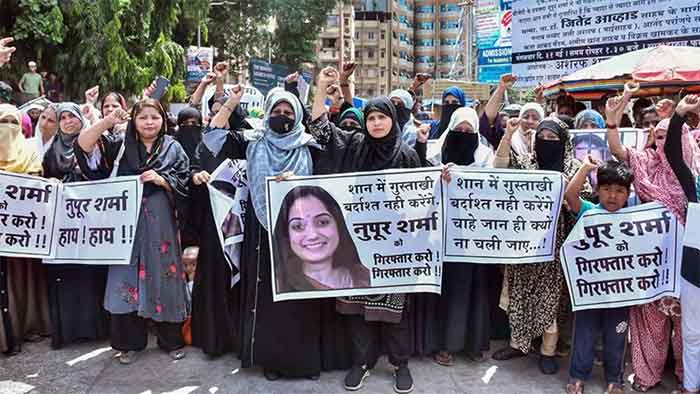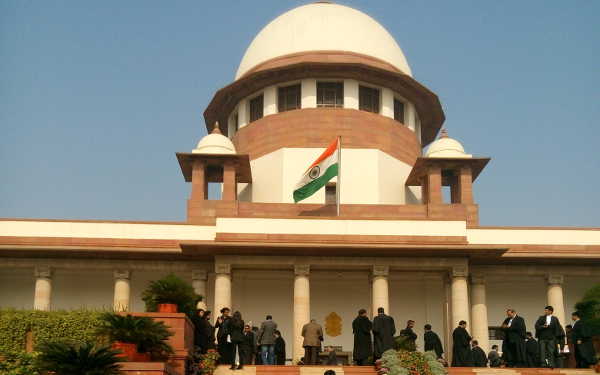
Nupur Sharma and Naveen Kumar Jindal reportedly made remarks against Prophet Muhammad. Indian Muslims are outraged. Islamic nations Kuwait, Oman, Bahrain, United Arab Emirates, Qatar and Saudi Arabia, and Iran, have taken serious diplomatic objection, and Qatar has reportedly demanded “public apology” from India.
In some of these countries, there are “… protests being lodged with the Indian missions, Indian goods being moved out of the supermarts, hashtags against India’s treatment of her Muslims trending, and not so veiled threats that Indians working in the region might lose their jobs. Qatar in fact canceled an official lunch being hosted for visiting Vice President of India Venkiah Naidu”. [The Citizen Editorial; “Iran and Saudi come together to condemn blasphemy”; <https://www.thecitizen.in/index.php/en/NewsDetail/index/6/21952/Iran-and-Saudi-Come-Together-to-Condemn-Blasphemy>; The Citizen; June 6, 2022]
Sharma and Jindal are reportedly members of the Bharatiya Janata Party, but more importantly, they are Indians, bound by the Constitution of India and the laws of India. They have embarassed and shamed India in international fora, and apart from affecting India’s international stature, their remarks have caused social unrest, thereby directly or indirectly adversely affecting India in multiple ways.
Social security
The existing socially vitiated atmosphere of the combination of lies, hate, distrust and fear on communal lines, has worsened due to Sharma and Jindal. This affects every individual’s personal security, and social security.
Law and order situations arising from social unrest adversely affect individuals, families and communities, regardless of their religion, caste, language, profession, etc. Naturally, the lowest socio-economic sections of people are, as always, hit the hardest, but perhaps barring the “top 1%”, every person is directly or indirectly deprived of safety and security to live a peaceful life.
Economic security
India’s economic situation, already hit for several reasons, most recently the corona pandemic, is worryingly worsening. The top 1% account for 5-7% of national income, while around 15% of the working population earns less than ₹5,000 monthly. Those earning ₹25,000 monthly fall into the top 10%, and account for 30-35% of national income. Worse, the top 1% shows growing income, while the bottom 10%’s income is shrinking – the rich get richer and the poor get poorer, the economic gap within societies widens, and anger and discontent increase.
If the Islamic countries block Indian exports or dismiss Indians working there, the downstream effect will at the very least, mean huge job losses, and loss of income security. This will inevitably exacerbate social unrest for economic reasons, with negative feedback effect on India’s economic security.
National security
There are also negative impacts on national security. The soldier stands guard on our borders facing the Chinese PLA and Pakistani Army, or performs internal security duties. He is far away from his family. Social unrest and violence which may affect the safety and security of his family, cannot but agitate his mind. It will adversely affect his function of providing national security by defending our borders against encroachment, infiltration, aggression, etc.
Social unrest within India greatly benefits our hostile neighbours, China and Pakistan. Social unrest diverts military attention to provide “aid to the civil power”, as demanded by State or Central governments, which are unable to deal with law and order situations caused by social unrest and its consequences. A significant component of our Indian Army is deployed on internal security (IS) duties to maintain or restore law and order, which is the primary responsibility and duty of political-bureaucratic-police civil administration authorities.
Social unrest will seriously hamper rapid movement of military forces and military logistics, should there be escalation of hostilities by China and Pakistan. Social unrest can and does affect military operations, thus affecting our external security.
National security has three important aspects:
# Social security comprising the security of the People, and the societies and communities of our diverse nation;
# Economic security; and
# Internal and external political and territorial sovereignty and security.
Other aspects such as energy security, food and water security, etc., are also important, but are not relevant to the present discussion, which is focussed upon social unrest, as argued above.
A matter which affects any aspect of national security deserves the immediate attention of Government of India. In view of the foregoing, Government of India might consider taking exemplary strict and adequate action against Nupur Sharma and Naveen Kumar Jindal, perhaps under the National Security Act.
S.G.Vombatkere holds a PhD in Civil Structural Dynamics (1987; I.I.T., Madras), and is a Fellow of The Institution of Engineers (India), and Fellow of The Indian Social Science Academy.
Email: <[email protected]>














































